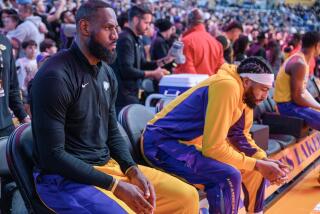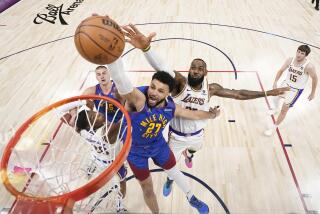If Lakers can’t beat them, then join them
- Share via
Now that the Lakers have some free time on their hands, they ought to spend tonight watching the Golden State Warriors vs. the Dallas Mavericks. They can add what they learn to the lessons the Phoenix Suns gave them during this brief five-game series.
It’s time for Phil Jackson and the Lakers to adopt a change in philosophy -- and I’m not talking about Zen vs. existentialism.
I’m talking about small vs. big, random shapes vs. the triangle.
The Lakers have tried to win now with Kwame Brown, staked their future to Andrew Bynum, while their fans have held out hope for Kevin Garnett. Big men are exceptionally hard to come by, especially when you don’t have salary cap room and have limited trade material.
So if the personnel options are limited, why not rethink the approach?
This is two consecutive years the Lakers couldn’t beat the Suns in the first round, so why not join them? Or even try to mimic Golden State, which has already produced two more victories than the Lakers this postseason.
The trend is toward small. The Lakers tried to go against the current but wound up adrift. They traded Caron Butler -- whose game meshed with Kobe Bryant’s better than anyone else’s on the roster -- for Brown. Butler became an All-Star, Brown is becoming Olowokandian in his level of top-pick disappointment.
It’s a lot easier to find a Matt Barnes or a Boris Diaw, players tossed aside or included as throw-ins, than to land one of the elusive big men. Besides, how many playoff series has Yao Ming won? (Answer: zero.)
Whatever it is, an increasingly agitated Bryant has an order: “Do something and do it now.”
Later, he said: “I’d like to see them make some strides this off-coming season. Make some strides to try to bring some players here that can get us to being a contender.”
The thing that separates these upstart teams is attitude even more than physical attributes.
“You’ve got to have a group of guys that’s willing to run and share the ball,” Suns center Amare Stoudemire said earlier in the series. “Without sharing the ball, it’s not going to work. You’ve got to have a core team and a solid team that really understands how important it is to share the ball.
“If you’ve got a dominant scorer, it’s tough for him to not be a dominant scorer. Having a fast break style of play, you’ve got to get yours within the offense.”
Phoenix and Golden State were the two highest scoring teams in the NBA this season, yet neither had an individual player among the league’s top 20 scorers.
Bryant has shown he can score better than anyone in the league for the past two seasons, and score at a rate that ranks with the game’s all-time greats.
But he hasn’t shown that it can lead to winning playoff series. The Lakers’ only victory in this series came when he made an effort to set up his teammates for shots in Game 3, rather than throw them the ball in desperation after getting caught in a double-team.
Bryant, more than any player in the league, can do anything he wants on the court. It’s just a question of what he wants to do, whether he’ll mold his game to be a part of something different.
“I’ll do whatever it takes to win,” Bryant said. “I’ve had to do a lot just to get us into the playoffs. I don’t want to do that. I want to win championships. I don’t want to be a one-man show, a team that goes onto the road, the opposition crowd wants to see me score 50 and lose.
“I’m not with that. I’m about winning. I want to win championships and win them now. So, they have some decisions to make.”
They might as well try a more open, up-tempo style. The Lakers pretty much stopped running the triangle in March, when the offense became Kobe-centric.
Traditionally, the downside to playing up-tempo is it doesn’t pay off in the playoffs. But Phoenix has advanced to the conference finals the last two years, and Golden State could move out of the first round with a victory tonight. Both are better off than the Lakers right now.
Of course, it will take more than a different approach by Jackson.
Jackson said so much of it has to do with having Steve Nash as a point guard and how impossible it is to duplicate what he does. That’s especially true when you’ve got Smush Parker running the Xerox machine.
But a funny thing happens when teams buy into sharing the ball. After a while it doesn’t matter who has the ball, he’s looking to pass. The Suns led, 64-52, at halftime even though Nash had a pedestrian five points and four assists. Even Kurt Thomas was making crisp passes.
The Lakers, meanwhile, had a grand total of seven assists for the game. They made only four of 17 three-point shots. The problem is, the shots don’t come in the normal flow of the offense, and players can’t be confident that if they miss this one the ball will come back to them the next time.
They know who’s taking the next shot. But so does the defense.
In the new NBA, predictability leads to the type of results many predicted for this series: Suns in five.
--
J.A. Adande can be reached at j.a.adande@latimes.com. To read previous columns by Adande, go to latimes.com/Adande.
More to Read
All things Lakers, all the time.
Get all the Lakers news you need in Dan Woike's weekly newsletter.
You may occasionally receive promotional content from the Los Angeles Times.







